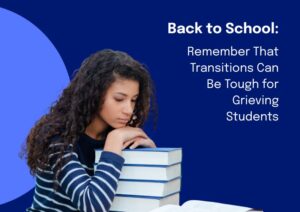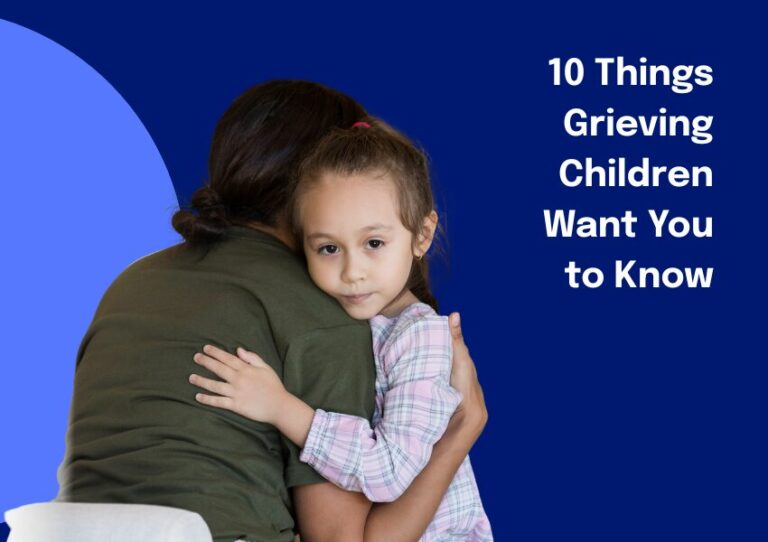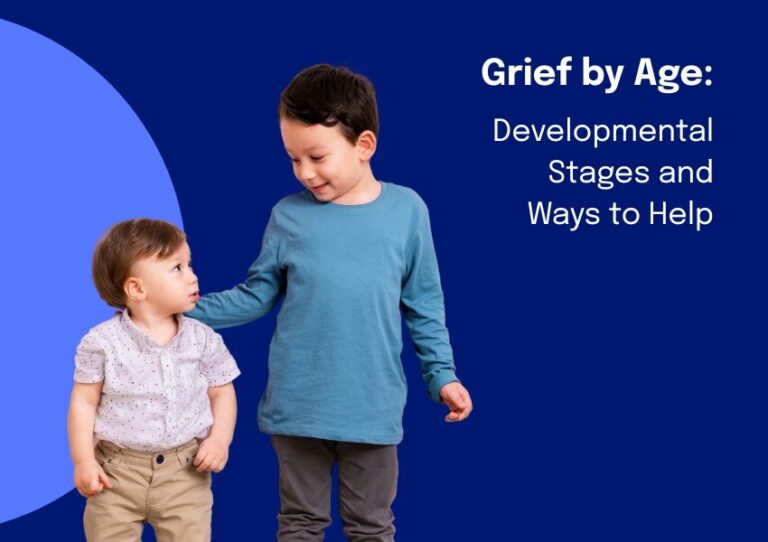Back to School: Remember That Transitions Can Be Tough for Grieving Students
Summer break is ending. Students are returning to school with a range of feelings and reactions. Some are delighted to be back in the social world of friends. Others are apprehensive about their upcoming classes. Some are excited to mark one more step forward as they grow and mature, especially if they’re moving up to middle or high school.
In all of the bustle of the year’s start, one group that can easily be overlooked is students who are grieving the loss of a parent, sibling, or other close family member or friend. Most education professionals would expect children with a recent loss to face some challenges in their academic focus. However, the ongoing experience of grief is often less recognized.
Here are three key features to remember about grief over time for children and teens:
- Grief proceeds on its own terms. Grief does not end at a fixed point. In many ways, children never get over a significant loss. It is a life-changing event.
- As children grow and develop, normal transitions and changes in their lives will remind them of their loss. A boy in elementary school whose father died may miss him acutely years later as he enters puberty. A girl navigating the new social intricacies of high school may wish more than ever for the guidance and advice of her mother who died several years prior. As grieving children see peers enjoying support from families, they may feel their loss deeply, even years after the death occurred.
- As children develop, they become more capable of understanding and adjusting to their loss. As time passes, the work of grieving becomes less difficult and requires less energy. It begins as a full-time job, but becomes more of a part-time effort that allows other meaningful experiences to occur. Grieving lasts a lifetime, but it does not need to consume a life.
AN IDEAL TIME TO MAKE A DIFFERENCE
The beginning of the school year is an ideal juncture for education professionals to remind themselves of steps that can help recognize and support grieving students over time.
- Recognize that grieving children are often more vulnerable at times of transition. This can be the start of the school year (new teachers, new classmates, new classroom). It can involve a change in schools or a change in the family—someone moving in or out. It can include the changes of puberty, the start of dating, or a breakup with a romantic partner. If you’ve been working with a grieving student who is transitioning to a new school, ask the student and parents if they would like you to notify the new school of the circumstances. Often, this creates a safer and more welcoming setting for the student. Families may appreciate being relieved of the need to contact the new school about the student’s situation. If you learn that one of your new students has experienced a death, reach out early in the year. Acknowledge that this can sometimes create challenges for students and let the student know you’re available to talk, or listen, if any concerns arise.
- Introduce subjects sensitively. Educators cannot know every student’s experience. When a history, literature, or other lesson addresses topics such as violence, death, loss, trauma, severe illness, racism, war, or other serious matters, provide some background before the lesson. Give students the opportunity to discuss any concerns with you privately. Make accommodations when indicated.
- Offer options for activities involving family members. Many students do not have a parent to turn to for family-based classroom or homework activities. This may be due to death, illness, divorce, military deployment, incarceration, or other reasons. Be sure to offer options: “For this essay, I’d like you to write about your mother or another woman in your life who has been helpful to you.”
- Support high school juniors and seniors in their college and career aspirations. After a death, teens may hesitate to move forward with plans to go to college, join the military, attend a trade school, or relocate to begin a job. They may feel the family needs them nearby. Sometimes they are expected to contribute financially to the family. While there is no single “correct” solution in these situations, the support of a trusted teacher or other school professional who can listen to a student’s concerns can be invaluable.
- Take care of yourself. Educators have also experienced losses, personal stressors, and other hardships. If an educator is anxious, sad, or angry, students are more likely to be affected by that emotional state than by the words they hear. The Coalition offers a module on steps for self-care for educators supporting grieving children. Self-care is not an “add on.” It is an essential step, allowing educators to offer the best possible support to worried and grieving students.
Educators can offer valuable support that makes a profound difference in grieving students’ lives. Often, this calls only for simple gestures that help students feel understood and affirmed in their experiences. The Coalition to Support Grieving Students has a collection of free video and written materials that offer guidance designed expressly for educators. Our organization is a member of the Coalition




